
Since its establishment in 1947, Pakistan has had an asymmetric federal government and is a federal parliamentary democratic republic. At the national level, the people of Pakistan elect a bicameral legislature, the Parliament of Pakistan. The parliament consists of a lower house called the National Assembly, which is elected directly, and an upper house called the Senate, whose members are chosen by elected provincial legislators. The head of government, the Prime Minister, is elected by the majority members of the National Assembly and the head of state, the President, is elected by the Electoral College, which consists of both houses of Parliament together with the four provincial assemblies. In addition to the national parliament and the provincial assemblies, Pakistan also has more than five thousand elected local governments.
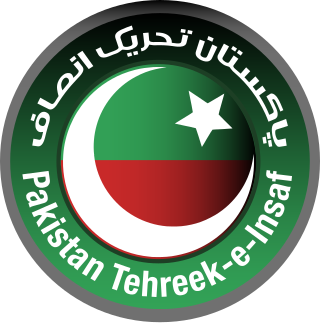
The Pakistan Tehreek-e-Insaf is a political party in Pakistan. It was founded in 1996 by Pakistani cricketer-turned politician Imran Khan, who served as the country's prime minister from 2018 to 2022. The PTI is one of the three major Pakistani political parties alongside the Pakistan Muslim League–Nawaz (PML–N) and the Pakistan People's Party (PPP), and it is the largest party in terms of representation in the National Assembly of Pakistan since the 2018 general election. With over 10 million members in Pakistan and abroad, it claims to be the country's largest political party by primary membership as well as one of the largest political parties in the world.
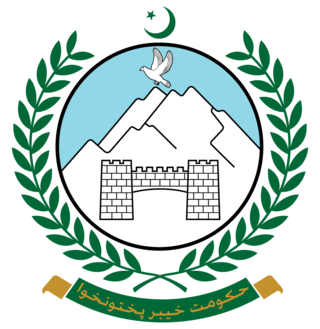
The Government of Khyber Pakhtunkhwa, is the provincial government of the Pakistani province of Khyber Pakhtunkhwa. Its powers and structure are set out in the provisions of the 1973 Constitution, in which 32 districts come under its authority and jurisdiction. The government includes the cabinet, selected from members the Khyber Pakhtunkhwa Assembly, and the non-political civil staff within each department. The province is governed by a unicameral legislature with the head of government known as the Chief Minister. The Chief Minister, invariably the leader of a political party represented in the Assembly, selects members of the Cabinet. The Chief Minister and Cabinet are thus responsible the functioning of government and are entitled to remain in office so long as it maintains the confidence of the elected Assembly. The head of the province is known as the Governor, appointed by the federal government, on behalf of the President, while the administrative boss of the province is Chief Secretary Khyber Pakhtunkhwa.

Shahram Khan Tarakai is a Pakistani politician who was Provincial Minister of Khyber Pakhtunkhwa of Local Government, Elections and Rural Development, in office from 29 August 2018 till 26 January 2020. He had been a member of the Provincial Assembly of Khyber Pakhtunkhwa from August 2018 till January 2023.
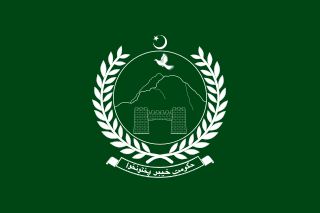
The Provincial Assembly ofKhyber Pakhtunkhwa is a unicameral legislature of elected representatives of the Pakistani province of Khyber Pakhtunkhwa, which is located in Peshawar, the provincial capital. It was established under Article 106 of the Constitution of Pakistan, having a total of 145 seats, with 115 general seats, 26 seats reserved for women and 4 reserved for non-Muslims. The 11th Provincial Assembly of the Khyber Pakhtunkhwa was dissolved on 18 January 2023, and the province is set to elect a new legislature on 8 October 2023.

The Politics of Karachi takes place at the municipal, provincial and federal levels of the government. Karachi is a multiethnic, multilingual, multicultural and multireligious metropolitan city. The demographics of Karachi are important as most politics in Karachi is driven by ethnic politics.

General elections were held in Pakistan on Wednesday, 25 July 2018 to elect the members of 15th National Assembly and the four Provincial Assemblies. The three major parties were Pakistan Tehreek-e-Insaf (PTI) led by Imran Khan, the Pakistan Muslim League led by Shehbaz Sharif and the Pakistan Peoples Party led by Bilawal Bhutto. The PTI won the most seats in the National Assembly but fell short of a majority; the party subsequently formed a coalition government with several smaller parties. At the provincial level, the PTI remained the largest party in Khyber Pakhtunkhwa (KP); the Pakistan Peoples Party (PPP) retained its dominance in Sindh and the newly formed Balochistan Awami Party (BAP) emerged as the largest party in Balochistan. In Punjab, the result was a hung parliament with the Pakistan Muslim League (N) winning the most seats. However, after several independents MPAs joined the PTI, the latter became the largest party and was able to form a government.

Pervez Khattak administration was the coalition of provincial government of Khyber Pakhtunkhwa between Pakistan Tehreek-e-Insaf (PTI), the Islamist Jamaat-e-Islami (JI), Qaumi Watan Party (QWP), and Awami Jamhuri Ittehad Pakistan (AJIP). AJIP later merged itself with PTI.

Senate elections were held in Pakistan on 5 March 2015 to elect the replacements for 52 retiring senators. Those retiring include chairman Nayyar Hussain Bukhari and deputy chairman Sabir Ali Baloch of the upper house. Pakistan Peoples Party (PPP), the majority party in Senate, would lose 21 members, followed by Pakistan Muslim League Nawaz would lose 9 and Awami National Party would lose 6 members.
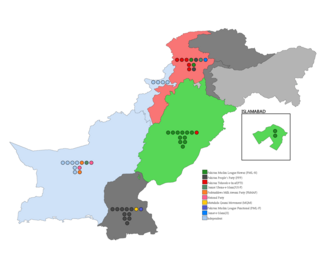
The triennial Senate Electionsof Pakistan were held on 3 March 2018 to replace 52 retiring senators - half of the Senate's strength - with the winning candidates serving six-year terms. Overall, Pakistan Muslim League (N) came out as the largest party, followed by the Pakistan Peoples Party and the Pakistan Tehreek-e-Insaf. The results of these elections were steeped in controversy due to rampant allegations of horse trading and vote-buying, which lead to the Prime Minister and opposition leader Imran Khan calling for reforms. Prior to this election, PML (N) candidates were declared as independents by the Election Commission of Pakistan owing to a Supreme Court judgment.

Mushtaq Ahmed Ghani is a Pakistani politician who is the Speaker of the Provincial Assembly of Khyber Pakhtunkhwa, and the Patron in Chief of Metrix Tech Summit. He had been a member of the Provincial Assembly of Khyber Pakhtunkhwa from August 2018 till January 2023. Previously, he was a member of the Provincial Assembly of Khyber Pakhtunkhwa from 2013 to 2018 and served in the provincial cabinet of Chief Minister Pervez Khattak as Provincial Minister for Higher Education and Information.
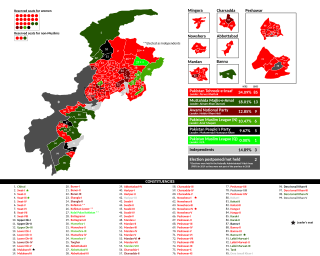
Provincial elections were held in the Pakistani province of Khyber Pakhtunkhwa on 25 July 2018 to elect the members of the 11th Provincial Assembly of Khyber Pakhtunkhwa, alongside nationwide general elections and three other provincial elections in Sindh, Balochistan and Punjab. The remaining two territories of Pakistan, AJK and Gilgit-Baltistan, were ineligible to vote due to their disputed status.
Several violent incidents happened before and on the day of the 2018 Pakistani general election, held on 25 July 2018.
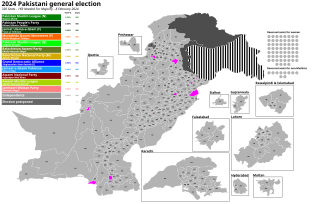
General elections are scheduled to be held in Pakistan on 8 February 2024 to elect the members of the 16th National Assembly. The detailed schedule was announced by Election Commission of Pakistan on 15 December 2023.

Provincial elections were held in the Pakistani province of Khyber Pakhtunkhwa's constituencies belonging to areas previously known as the Federally Administered Tribal Areas (FATA) on 20 July 2019. After the election, the new members joined the already elected members from the rest of the province to complete the formation of 11th Provincial Assembly of Khyber Pakhtunkhwa.
The 2021 Khyber Pakhtunkhwa local elections were held in 17 districts of Khyber Pakhtunkhwa, Pakistan on 19 December 2021. Jamiat Ulema-e-Islam (F) won the most seats. In second phase PTI won the most vote by 31 seats while JUI (F) won 5 seats and independent won 12 seats.
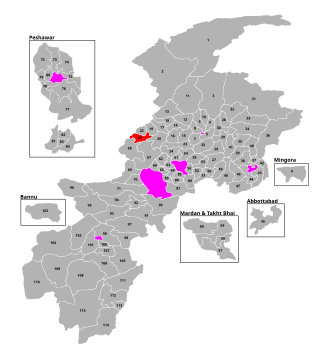
PK-21 Bajaur-III is a constituency for the Khyber Pakhtunkhwa Assembly of the Khyber Pakhtunkhwa province of Pakistan.It was created in 2018 after merger of FATA with Khyber Pakhtunkhwa before 2019 elections.
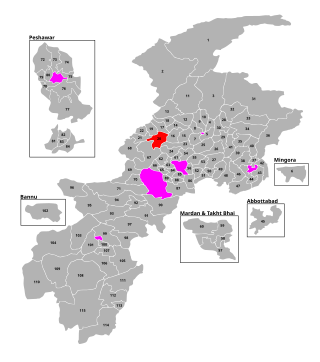
PK-20 Bajaur-II is a constituency for the Khyber Pakhtunkhwa Assembly of the Khyber Pakhtunkhwa province of Pakistan.It was created in 2018 after merger of FATA with Khyber Pakhtunkhwa before 2019 elections.

PK-67 Mohmand-I is a constituency for the Khyber Pakhtunkhwa Assembly of the Khyber Pakhtunkhwa province of Pakistan.It was created in 2018 after merger of FATA with Khyber Pakhtunkhwa before 2019 elections.

PK-68 Mohmand-II is a constituency for the Khyber Pakhtunkhwa Assembly of the Khyber Pakhtunkhwa province of Pakistan.It was created in 2018 after merger of FATA with Khyber Pakhtunkhwa before 2019 elections.

















